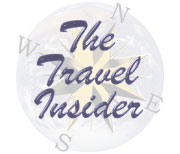
I have partnered with a number of companies, most of which are personally known to me. They are reputable, with good quality products and services. If you click on the links from this page and then choose to buy any of their products, I get a small referral fee. Your prices are the same, or sometimes even lower than normal, so it costs you nothing, while I get a small commission. Truly a win-win for us all, and a helpful way of contributing to the ongoing publishing costs I incur.
I believe I have now completed the transition of the website's identity to its new URL of www.TheTravelInsider.Info. Please let me know if anything seems broken.
This Week's Column : SAMs – The New Air Security Threat : The bad news - most airplanes are defenseless against SAMs. The worse news - there are thousands of SAMs potentially in the hands of terrorists. The worst news of all – airplanes could be equipped with anti-missile systems, but the airlines are balking at the cost. Read more, including an insider guess as to how the Israeli plane avoided the two missiles fired at it last weekend, in this week’s column.
I complained last week about Alaska Airlines still requiring a two hour advance checkin. Reader Tom in Anchorage has this explanation
I'm pleased to explain why Alaska Airlines requires a two-hour-prior check-in time. Obviously you haven't been to Anchorage airport recently. The security screening lines are HORRIBLE, often requiring waits of at least 30-60 minutes during peak departure times (evenings). This is one of our nation's most shameful and disgusting airports.
He points out this is not Alaska's fault, but rather the fault of the TSA for failing to meet its self-imposed 'no more than ten minutes in line' objective.
And reader Paul adds
I am an 18 plus year employee with a major east coast airline. While I agree passengers do not need to arrive 2 hours early, I can tell you if they want their luggage put on it better be on its way to us 30-45 minutes ahead of time. They want us to give good customer service but the layoffs continue. We just don't have the people to do the job. Therefore check in early.
Talking about complaining, it is now 35 days since I faxed to BA's New York Customer 'Service' department asking for compensation for my two day delayed flights and luggage. No response so far.
I heard an interesting story about BA last night while speaking with a senior executive of another foreign airline. He told me how he had been negotiating with BA to use their airport lounge for his airline's business and first class passengers. It would present no problems for BA, because the flights depart at different times. But he was appalled at how much BA wanted to charge him - $50 per lounge guest per visit!
I hope you haven't been caught by the East Coast storms. During winter, it is always prudent to do a weather check for where you're going and any airports you'll be transiting through. Thanks to reader David for this excellent web resource that makes it easy to get an immediate read of the nation's storm weather situation.
A new report in the UK is putting the frighteners on the British public, who are becoming accustomed to copious discount air travel. The report claims that too many flights are creating ecological damage and suggests that airport/runway construction should be frozen and that a surcharge of perhaps £70 ($110) be added to each flight to depress demand and reduce air traffic.
Expedia announced on Wednesday that it is adding a $5 service fee to all airline tickets bought through its website. This is for very different reasons than why travel agencies now charge a fee. Travel agencies get zero commission on airline tickets, but incur real labor costs to manage each ticket booking request that comes in to their office - if they didn't charge a fee, they'd be losing money on every ticket they issued. Expedia, on the other hand, earns commissions from the airlines on the tickets it sells, and, because it is all computerized, incurs almost zero labor and other costs for every ticket it sells.
Whereas travel agents need to charge a fee to stop losing money, Expedia is adding a fee simply to make more money. "We are adding fees because we want to maintain the high quality of service in light of the recent declines of revenue per ticket from the airlines," Expedia spokeswoman Andrea Riggs said. Didn't she perhaps mean to say 'high level of profit' instead of 'high quality of service'?
Talking about travel agents, an interesting news item made its way up here from Australia. The Australian Competition and Consumer Commission concluded that a healthy travel agent industry is necessary to foster competition. It accordingly required IATA (the international airlines group) to make its relationship with Australian travel agencies more agency-friendly, because this translates to better deals for you, the traveling public. I guess the airlines don't have as effective a lobbying group in Australia as they do up here.
Which brings me to United Airlines. Were you surprised at the news that UA's application for a $1.8 billion dollar loan guarantee was declined by the ATSB? But notice the loophole in the ATSB decision. ATSB Directory Montgomery wrote to United "This is not a final denial. This is we cannot approve the business plan as proposed." He explained that United may resubmit its application as many times as it wants until the board releases a 'final decision'.
So who wants to bet that this first refusal is a face-saving political ploy to appease all the many people that don't believe UA deserves any government bailout at all, and then will be reversed in a subsequent approval, legitimized by a claim that UA have done a better job of restructuring?
United's shares traded briefly this morning then trading was halted until mid afternoon, when it resumed. Normal daily volume is 4 million shares traded, today 45 million shares traded, closing at $1.00, a 68% drop from the previous day. Just about everyone anticipates a bankruptcy filing by UA very soon, although United itself has gone out of its way to say that it will essentially be 'business as usual' if (when!) they do declare Chapter 11.
At least for now, your Mileage Plus miles are probably safe. But isn't time to think about switching carriers for the future - just about any other airline will give you direct access into a comparable level of premium frequent flier status if you show them your current premier level with UA.
Talking about premium frequent flier status, American Airlines is offering its not quite premium level frequent fliers a chance to buy up to premium status. The cost - between $395 and $595.
If the whole air travel thing is getting too much for you, good news on the car front. For the first time since 1993, the costs of owning and operating a car are on the decline. The drop of approximately 0.8 cent a mile (to 50.2 cents per mile driven) might seem trivial, but based on average mileage of 15,000 a year, it can add up to a $121 savings over 12 months. AAA, in an annual survey, estimates the average total cost for driving a car in the U.S. in 2002 is $7,533, compared with $7,654 in calendar 2001. AAA uses a composite national average of three domestically built 2002 cars - a subcompact Chevrolet Cavalier LS, a midsize Ford Taurus SEL Deluxe and a full-size Mercury Grand Marquis LS.
Lots of people seem to be driving instead of flying, or just simply not traveling at all. November airline statistics now coming in show that American had a reduction of 18.5% (compared to 2000) and Continental a reduction of 13.7%.
Merrill Lynch issued a report on the airline industry on Wednesday that predicts the industry will face another year of losses in 2003. The report surveyed business travelers in the U.S. and found that corporate travel will be flat next year and may not increase until the end of 2004. It also said that American carriers will lose $4.2 billion in total next year as business travelers surveyed said they were cutting travel budgets by more than 10%. Companies indicated that they would be using more low-fare carriers in 2003 so carriers like AirTran, Frontier, JetBlue, Southwest and WesJet are likely to benefit from increased corporate travel.
Or maybe you might want to take a bus. Which brings us to -
This week's security horror story : A Greyhound bus encountered heavy congestion out of Philadelphia, and so the driver took some back roads to beat the traffic. Passengers didn't appreciate his efforts and thought he was lost, and variously got angry or taunted the driver, asking him if he knew where he was going. The driver then made a joke and called back to the passengers 'I'm taking you to the Taliban'.
Some of the 30 passengers then panicked and dialed 911 on their cell phones. A short while later, 18 police cars surrounded the bus and pulled it over, ordering the passengers out at gun point, and taking the driver away to police headquarters for questioning. Prosecutors subsequently said that they were 'investigating' the driver but did not give details.
A brick wins a prize for 'This Week's Strangest Object Seized from a Passenger'. Over the Thanksgiving period, security screeners seized 15,982 pocket knives, 3242 'banned tools', 2384 flammable items, 1072 clubs or bats, 98 boxcutters, six guns and one brick. I don't actually see bricks mentioned on the prohibited items list that the TSA publish!
This week's 'Not The Shortest Distance Between Two Points' award goes to railway staff in the UK for forcing a wheelchair bound woman, ironically on her way to discuss polices for disabled passengers with railway department bosses, to take a two hour train ride just so she could cross over to a different platform at the same station so that she could then board the train she wished to take. Thanks to the Bonehead of the Day Newsletter for this gem. Bonehead is one of my favorite newsletters.
And this week's 'Least Promising New Tourism Destination' award goes to the Perm Forced Labor Camp. Tourists bored with luxury and good food can now go to Russia and experience one of the horrors of Soviet life - a night in a Stalin-era gulag. Russians still shudder at the mention of the Perm forced labor camp in the Urals, which opened in 1946 and closed in 1987. But tourists can now voluntarily stay the night, eat prisoner food, and feel what it was like to be a political prisoner in Soviet times. It is not clear yet how many people have taken up the holiday offer.
Until next week, please enjoy safe travels.
